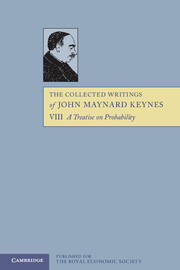Book contents
- Frontmatter
- Contents
- General Introduction
- Editorial Foreword by R. B. Braithwaite
- Editorial Note
- Preface to the First Edition
- I FUNDAMENTAL IDEAS
- 1 THE MEANING OF PROBABILITY
- 2 PROBABILITY IN RELATION TO THE THEORY OF KNOWLEDGE
- 3 THE MEASUREMENT OF PROBABILITIES
- 4 THE PRINCIPLE OF INDIFFERENCE
- 5 OTHER METHODS OF DETERMINING PROBABILITIES
- 6 THE WEIGHT OF ARGUMENTS
- 7 HISTORICAL RETROSPECT
- 8 THE FREQUENCY THEORY OF PROBABILITY
- 9 THE CONSTRUCTIVE THEORY OF PART I SUMMARISED
- II FUNDAMENTAL THEOREMS
- III INDUCTION AND ANALOGY
- IV SOME PHILOSOPHICAL APPLICATIONS OF PROBABILITY
- V THE FOUNDATIONS OF STATISTICAL INFERENCE
- Bibliography
- Index
2 - PROBABILITY IN RELATION TO THE THEORY OF KNOWLEDGE
from I - FUNDAMENTAL IDEAS
Published online by Cambridge University Press: 05 November 2012
- Frontmatter
- Contents
- General Introduction
- Editorial Foreword by R. B. Braithwaite
- Editorial Note
- Preface to the First Edition
- I FUNDAMENTAL IDEAS
- 1 THE MEANING OF PROBABILITY
- 2 PROBABILITY IN RELATION TO THE THEORY OF KNOWLEDGE
- 3 THE MEASUREMENT OF PROBABILITIES
- 4 THE PRINCIPLE OF INDIFFERENCE
- 5 OTHER METHODS OF DETERMINING PROBABILITIES
- 6 THE WEIGHT OF ARGUMENTS
- 7 HISTORICAL RETROSPECT
- 8 THE FREQUENCY THEORY OF PROBABILITY
- 9 THE CONSTRUCTIVE THEORY OF PART I SUMMARISED
- II FUNDAMENTAL THEOREMS
- III INDUCTION AND ANALOGY
- IV SOME PHILOSOPHICAL APPLICATIONS OF PROBABILITY
- V THE FOUNDATIONS OF STATISTICAL INFERENCE
- Bibliography
- Index
Summary
1. I do not wish to become involved in questions of epistemology to which I do not know the answer; and I am anxious to reach as soon as possible the particular part of philosophy or logic which is the subject of this book. But some explanation is necessary if the reader is to be put in a position to understand the point of view from which the author sets out; I will, therefore, expand some part of what has been outlined or assumed in the first chapter.
2. There is, first of all, the distinction between that part of our belief which is rational and that part which is not. If a man believes something for a reason which is preposterous or for no reason at all, and what he believes turns out to be true for some reason not known to him, he cannot be said to believe it rationally, although he believes it and it is in fact true. On the other hand, a man may rationally believe a proposition to be probable, when it is in fact false. The distinction between rational belief and mere belief, therefore, is not the same as the distinction between true beliefs and false beliefs. The highest degree of rational belief, which is termed certain rational belief, corresponds to knowledge. We may be said to know a thing when we have a certain rational belief in it, and vice versa.
- Type
- Chapter
- Information
- The Collected Writings of John Maynard Keynes , pp. 10 - 20Publisher: Royal Economic SocietyPrint publication year: 1978

